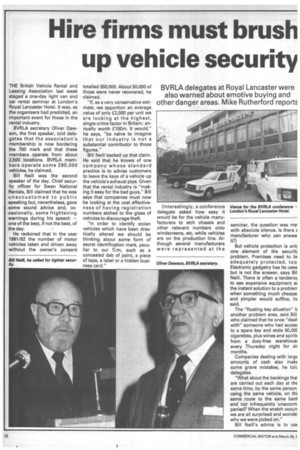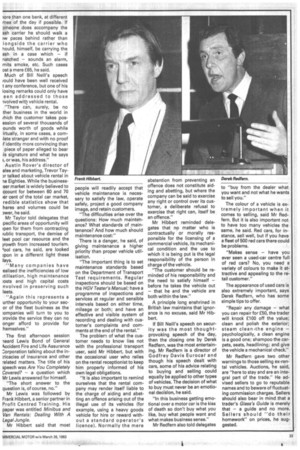Hire firms must brush up vehicle security
Page 34

Page 35

If you've noticed an error in this article please click here to report it so we can fix it.
BVRLA delegates at Royal Lancaster were also warned about emotive buying and other danger areas. Mike Rutherford reports
THE British Vehicle Rental and Leasing Association last week staged a one-day light van and car rental seminar at London's Royal Lancaster Hotel. It was, as the organisers had predicted, an important event for those in the rental industry.
BVRLA secretary Oliver Dawson, the first speaker, told delegates that the association's membership is now bordering the 700 mark and that these members operate from about 2,500 locations, BVRLA members operate some 280,000 vehicles, he claimed.
Bill Neill was the second speaker of the day. Chief security officer for Swan National Rentals, Bill claimed that he was unaccustomed to public speaking but, nevertheless, gave some sound advice and, occasionally, some frightening warnings during his speech one of the best, if not the best, of the day.
He reckoned that in the year 1981/82 the number of motor vehicles taken and driven away without the owner's consent totalled 350,000. About 50,000 of those were never recovered, he claimed.
"If, as a very conservative estimate, we apportion an average value of only £2,000 per unit we are looking at the highest, single crime factor in Britain; annually worth £100m. It would," he says, "be naïve to imagine that our industry is not a substantial contributor to those figures."
Bill Neill backed up that claim. He said that he knows of one company whose standard practice is to advise customers to leave the keys of a vehicle up the vehicle's exhaust pipe. Given that the rental industry is "making it easy for the bad guys," Bill says that companies must now be looking at the cost effectiveness of having registration numbers etched to the glass of vehicles to discourage theft.
"In order to identify stolen vehicles which have been drastically altered we should be thinking about some form of secret identification mark, peculiar to our rirm, such as a concealed dab of paint, a piece of tape, a label or a hidden business card."
Onterestingly, a conference delegate asked how easy it would be for the vehicle manufacturers to etch chassis and other relevant numbers onto windscreens, etc, while vehicles are on the production line. Although several manufacturers were represented at the seminar, the question was mei with absolute silence. Is there E manufacturer who can ansvve it?) But vehicle protection is onl} one element of the securit-} problem. Premises need to bE adequately protected, too Electronic gadgetry has its uses but is not the answer, says Bil Neill. There is often a tendenc} to see expensive equipment a: the instant solution to a problerr when something much cheapei and simpler would suffice, hE said.
The "floating key situation" iE another problem area, said Bill• who claimed that he once "deali with" someone who had acces: to a spare key and stole 60,00C cigarettes, plus wines and spirit. from a duty-free warehous4 every Thursday night for sb months.
Companies dealing with largE amounts of cash also makE some grave mistakes, he tolc delegates.
"What about the bankings thai are carried out each day at thE same time, by the same person using the same vehicle, on thE same route to the same banl and not infrequently unaccorn panied? When the snatch occur: we are all surprised and wondel why we were picked on."
Bill Neill's advice is to USE lore than one bank, at different mes of the day if possible. If Dmeone does accompany the ash carrier he should walk a me paces behind rather than longside the carrier who hould, himself, be carrying the ash in a case which — if natched — sounds an alarm, mits smoke, etc. Such cases ost a mere £65, he said.
Mich of Bill Neill's speech rould have been well received t any conference, but one of his losing remarks could only have een addressed to those wolved witf vehicle rental.
"There can, surely, be no ther business in the world in rhich the customer takes posession of several thousands of lounds worth of goods while irtually, in some cases, a corn"late stranger and with no proof if identity more convincing than piece of paper alleged to bear is signature and what he says a, or was, his address."
Austin Rover's director of ales and marketing, Trevor Tay)r talked about vehicle rental in he Eighties. While the businessser market is widely believed to ccount for between 60 and 70 ercent of the total car market, redible statistics show that hares and volumes could be Dwer, he said.
Mr Taylor told delegates that pecific areas of opportunity will pen for them from contracting ublic transport, the demise of leet pool car resource and the Kowth from increased tourism. 'tool cars, he said, are looked ipon in a different light these lays.
"Many companies have eased the inefficiencies of low itilisation, high maintenance :osts and high capital costs nvolved in preserving such leets.
"Again this represents a urther opportunity to your secor of the fleet business as the :ompanies will turn to you to rrovide the service they can no onger afford to provide for hemselves."
The first afternoon session ward Lewis Bond of General etccident Fire and Life Assurance :.:orporation talking about the inlricacies of insurance and other related matters. The title of his speech was Are You Completely Covered? — a question which Mr Lewis answered for himself. "The short answer to the question is, of course, no."
Mr Lewis was followed by Frank Hibbert, a senior partner in Profit Centred Training. His paper was entitled Minibus and Van Rentals: Dealing With A Legal Jungle.
Mr Hibbert said that most people will readily accept that vehicle maintenance is necessary to satisfy the law, operate safely, project a good company image, and retain customers.
"The difficulties arise over the questions: How much maintenance? What standards of maintenance? And how much should maintenance cost:" There is a danger, he said, of giving maintenance a higher priority than proper vehicle utilisation.
"The important thing is to set maintenance standards based on the Department of Transport Test requirements. Regular inspections should be based on the HGV Tester's Manual; have a programme of inspections and services at regular and sensible intervals based on either time, mileage or both; and have an effective and visible system of recording and dealing with customer's complaints and comments at the end of the rental."
The problem of what the customer needs to know lies not with the professional transport user, said Mr Hibbert, but with the occasional user who relies on the rental receptionist to keep him properly informed of his own legal obligations.
"It is also important to remind ourselves that the rental company may render itself liable to the charge of aiding and abetting an offence arising out of the illegal use of its vehicles (for example, using a heavy goods vehicle for hire or reward without a standard operator's licence). Normally the mere abstention from preventing an offence does not constitute aiding and abetting, but where the company can be said to exercise any right or control over its customer, a deliberate refusal to exercise that right can, itself be an offence."
Mr Hibbert reminded delegates that no matter who is contractually or morally responsible for the licensing of a commercial vehicle, its mechanical condition and the use to which it is being put is the legal responsibility of the person in charge of the vehicle.
"The customer should be reminded of his responsibility and the need to satisfy himself — before he takes the vehicle out — that he and the vehicle are both within the law."
A principle long enshrined in British law maintains that ignorance is no excuse, said Mr Hibbert.
If Bill Neill's speech on security was the most thought provoking speech of the day, then the closing one by Derek Redfern, was the most entertain ing. Mr Redfern is a director of Godfrey Davis Eurocar and though his speech dealt with cars, some of his advice relating to buying and selling could equally be applied to other types of vehicles. The decision of what to buy must never be an emotional decision, he said.
"In this business getting emotional over a motor car is the kiss of death so don't buy what you like, buy what people want and what makes business sense."
Mr Redfern also told delegates to "buy from the dealer what you want and not what he wants to sell you."
The colour of a vehicle is extremely important when it comes to selling, said Mr Redfern. But it is also important not to have too many vehicles the same, he said. Red cars, for instance, sell well, but if you have a fleet of 500 red cars there could be problems.
"Makes sense — have you ever seen a used-car centre full of red cars? No, you need a variety of colours to make it attractive and appealing to the retail customer."
The appearance of used cars is also extremely important, says Derek Redfern, who has some simple tips to offer.
"Repair any damage — what you can repair for E50, the trader will knock £100 off the value; clean and polish the exterior; steam clean 'the engine — psychologically, a clean engine is a good one; shampoo the carpets, seats, headlining; and give the vehicle a mechanical check."
Mr Redfern gave two other warnings to those selling ex-rental vehicles. Auctions, he said, are "here to stay and are an integral part of the trade." He advised sellers to go to reputable names and to beware of fluctuating commission charges. Sellers should also bear in mind that a trader's Glass's Guide is merely that — a guide and no more. Sellers should "do their homework" on prices, he suggested.
















































































